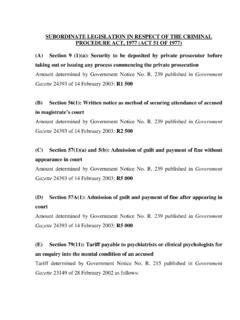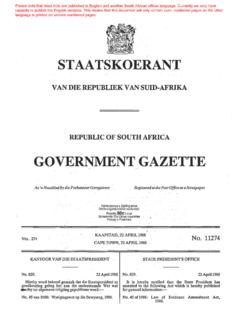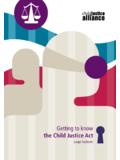Transcription of CONSTITUTIONAL COURT OF SOUTH AFRICA - …
1 CONSTITUTIONAL COURT OF SOUTH AFRICA Case CCT 150/14 In the matter between: ANNA-MARIE DE VOS First Applicant MARIA STUURMAN Second Applicant SARAH SNYDERS Third Applicant MORNAY CALITZ Fourth Applicant and MINISTER OF JUSTICE AND CONSTITUTIONAL DEVELOPMENT First Respondent MINISTER OF HEALTH Second Respondent DIRECTOR OF PUBLIC PROSECUTIONS, WESTERN CAPE Third Respondent and CAPE MENTAL HEALTH Amicus Curiae Neutral citation: De Vos and Others v Minister of Justice and CONSTITUTIONAL Development and Others [2015] ZACC 21 Coram: Mogoeng CJ, Moseneke DCJ, Froneman J, Khampepe J, Leeuw AJ, Madlanga J, Nkabinde J, Tshiqi AJ, Van der Westhuizen J and Zondo J Judgment: Leeuw AJ (unanimous) 2 Heard on: 17 November 2014 Decided on: 26 June 2015 Summary: criminal Procedure Act 51 of 1977 section 77(6)(a)(i) capacity of accused to understand proceedings constitutionally invalid to the extent that it mandates the imprisonment of an adult accused person and to the extent that it mandates the hospitalisation or imprisonment of children criminal Procedure Act 51 of 1977 section 77(6)(a)(ii) capacity of accused to understand proceedings constitutionally invalid to the extent that it mandates the institutionalisation of accused ORDER This is an application for confirmation of the order of the Western Cape Division of the High COURT , Cape Town: 1.
2 The declaration of invalidity made by the Western Cape Division of the High COURT , Cape Town, on 5 September 2014 is not confirmed. 2. Section 77(6)(a)(i) of the criminal Procedure Act 51 of 1977 is declared to be inconsistent with the Constitution and invalid to the extent that it provides for: (a) compulsory imprisonment of an adult accused person; and (b) compulsory hospitalisation or imprisonment of children. 3. The declaration of invalidity is suspended for a period of 24 months from the date of this judgment in order to allow Parliament to correct the defects in light of this judgment. 4. Section 77(6)(a)(ii) of the criminal Procedure Act 51 of 1977 is declared to be inconsistent with the Constitution and invalid. From the date of this order section 77(6)(a)(ii) is to read as follows: 3 (ii) where the COURT finds that the accused has committed an offence other than one contemplated in subparagraph (i) or that he or she has not committed any offence (aa) be admitted to and detained in an institution stated in the order as if he or she were an involuntary mental health care user contemplated in section 37 of the Mental Health Care Act 17 of 2002; (bb) be released subject to such conditions as the COURT considers appropriate; or (cc) be released unconditionally.
3 5. The orders in paragraphs 2 and 4 are not retrospective. JUDGMENT LEEUW AJ (Mogoeng CJ, Moseneke DCJ, Froneman J, Khampepe J, Madlanga J, Nkabinde J, Tshiqi AJ, Van der Westhuizen J and Zondo J concurring): Introduction [1] This is an application for confirmation1 of a declaration of CONSTITUTIONAL invalidity of section 77(6)(a)(i) and (ii) of the criminal Procedure These confirmation proceedings concern the constitutionality of the impugned provisions to the extent that a presiding officer is required to institutionalise, imprison or place a 1 Section 167(5) of the Constitution provides that [t]he CONSTITUTIONAL COURT makes the final decision whether an Act of Parliament, a provincial Act or conduct of the President is CONSTITUTIONAL , and must confirm any order of invalidity made by the Supreme COURT of Appeal, the High COURT of SOUTH AFRICA , or a COURT of similar status, before that order has any force.
4 2 51 of 1977 . See [15] for the full text of section 77(6)(a). LEEUW AJ 4 mentally ill or an intellectually disabled accused person in a psychiatric hospital. Griesel J, in the Western Cape Division of the High COURT , Cape Town (High COURT ) held that the impugned section is peremptory and thus inconsistent with the Constitution in that it infringes a mentally ill or an intellectually disabled person s right to freedom and security of the person3 as well as children s [2] A three-stage process governs the treatment of an accused suspected of lacking the capacity to understand COURT proceedings. First, an accused person is referred for observation in terms of section 77(1).5 Second, an investigation into the mental capacity of the accused is conducted and reported on as prescribed by section Thereafter, the COURT has wide discretionary powers in terms of section 79(2)(c).7 3 Section 12(1) provides: Everyone has the right to freedom and security of the person, which includes the right (a) not to be deprived of freedom arbitrarily or without just cause; (b) not to be detained without trial; (c) to be free from all forms of violence from either public or private sources; (d) not to be tortured in any way; and (e) not to be treated or punished in a cruel, inhuman or degrading way.
5 4 Section 28, in relevant part, provides: (1) Every child has the right .. (g) not to be detained except as a measure of last resort, in which case, in addition to the rights a child enjoys under sections 12 and 35, the child may be detained only for the shortest appropriate period of time, .. (2) A child s best interests are of paramount importance in every matter concerning the child. 5 It is a fundamental principle of our criminal justice system that an accused must be able to understand the COURT proceedings as well as give proper instructions to his or her legal representative to enable him or her to conduct a proper defence. If the presiding officer is under the impression that the accused cannot understand the COURT proceedings due to a mental illness or mental defect , he or she must direct that the mental capacity of an accused be investigated and reported on in terms of section 79 this can be done at any stage in the proceedings. 6 For the more serious offences referred to in section 77(6)(a)(i) this observation and report is to be conducted by two psychiatrists (and a clinical psychologist if the COURT so directs) and for less serious offences referred to in section 77(6)(a)(ii) the COURT shall direct that the accused be examined by one psychiatrist.
6 In most instances, a finding of mental illness or defect is left to mental health experts. 7 Section 79(2)(c) provides: The COURT may make the following orders after the enquiry referred to in subsection (1) has been conducted LEEUW AJ 5 [3] Third, if there has been a request by a prosecutor that the accused person be dealt with in terms of section 77(6) and the COURT has exercised its discretion to refer the accused to a COURT having jurisdiction in terms of section 75, then the processes of section 77(6) will apply. A trial of the facts may This is in order to assess whether, on a balance of probabilities, the accused was involved in committing the offence. If found to have committed a serious offence contemplated in section 77(6)(a)(i) the COURT shall direct that the accused .. be detained in a psychiatric hospital or prison pending the decision of a judge in chambers . In terms of section 77(6)(a)(ii), if it is established, on a balance of probabilities, that the accused committed a minor offence or has not been found to have committed any offence, the COURT shall direct that the accused.
7 Be admitted to and detained in an institution . The Parties [4] The first applicant, Ms De Vos , is a curator ad litem appointed by the High COURT to represent Mr Stuurman, who has an intellectual disability. The second applicant, Ms Stuurman, is the mother of Mr Stuurman. The fourth applicant, Mr Calitz , was appointed as curator ad litem by the High COURT to represent Mr Snyders who also has an intellectual disability. The third applicant, Ms Snyders, is the mother of Mr Snyders. The respondents are the Minister of Justice and CONSTITUTIONAL Development, the Minister of Health and the Director of Public (i) postpone the case for such periods referred to in paragraph (a), as the COURT may from time to time determine; (ii) refer the accused at the request of the prosecutor to the COURT referred to in section 77(6) which has jurisdiction to try the case; (iii) make any other order it deems fit regarding the custody of the accused; or (iv) any other order.
8 8 This assessment is about the act only and does not engage in any enquiry around the guilt of the accused. Section 77(6)(a) envisages two steps: (i) on the limited evidence available, whether it can be proved on a balance of probabilities that the accused committed the act in question; and (ii) taking into account the nature of the accused s incapacity, whether it would be in the interests of the accused to place information or evidence before the COURT to determine whether the accused has committed the act in question. See Kruger Accused: Capacity to Understand Proceedings: Mental Illness and criminal Responsibility in Heimstra s criminal Procedure Service 7 (2014) at 13-8 which characterises this process as a trial of the facts . LEEUW AJ 6 Prosecutions, Western Cape (DPP). Cape Mental Health, a voluntary association and non-profit organisation working as a specialist organisation in the area of mental health, applied and was admitted as amicus curiae (a friend of the COURT ).
9 Background [5] Mr Stuurman and Mr Snyders face charges of murder and rape respectively. The proceedings in terms of section 77(6)(a) have been postponed pending the outcome of the CONSTITUTIONAL challenge. Their matters commenced as separate applications that were subsequently consolidated and heard together in the High COURT in light of the similarity of the relief sought. In the Stuurman matter, the accused was 14 years old when, in 2005, he allegedly stabbed a 14 year old girl to death. He was arraigned for murder in the Oudtshoorn Regional COURT . He sustained a serious head injury at the age of five years which left him severely intellectually disabled. For this reason, the Magistrate referred him for observation in terms of sections 77(1)9 and 78(2)10 read with section 7911 of the criminal Procedure Act. He was evaluated by 9 Section 77(1) provides: If it appears to the COURT at any stage of criminal proceedings that the accused is by reason of mental illness or mental defect not capable of understanding the proceedings so as to make a proper defence, the COURT shall direct that the matter be enquired into and be reported on in accordance with the provisions of section 79.
10 10 Section 78(2) provides: If it is alleged at criminal proceedings that the accused is by reason of mental illness or mental defect or for any other reason not criminally responsible for the offence charged, or if it appears to the COURT at criminal proceedings that the accused might for such a reason not be so responsible, the COURT shall in the case of an allegation or appearance of mental illness or mental defect, and may, in any other case, direct that the matter be enquired into and be reported on in accordance with the provisions of section 79. 11 Section 79, in relevant part, provides: (1) Where a COURT issues a direction under section 77(1) or 78(2), the relevant enquiry shall be conducted and be reported on (a) where the accused is charged with an offence other than one referred to in paragraph (b), by the medical superintendent of a psychiatric hospital designated by the COURT , or by a psychiatrist appointed by the medical superintendent at the request of the COURT ; or (b) where the accused is charged with murder or culpable homicide or rape or compelled rape as provided for in sections 3 or 4 of the criminal Law (Sexual Offences and Related Matters) Amendment Act, 2007, respectively, or another charge involving serious violence, or if the COURT considers it to be necessary in the public interest, or where the COURT in any particular case so directs LEEUW AJ 7 three psychiatrists.












